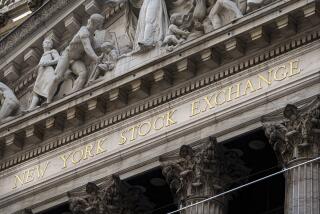Stocks fall, credit risk rises to record on Merkel bond comments
- Share via
Stocks fell, Italian bonds declined and the cost of insuring European government debt against default rose to a record after German Chancellor Angela Merkel ruled out joint euro-area borrowing.
The MSCI All-Country World Index retreated 0.2% at 5 p.m. in New York. The yield on Italy’s 10-year bonds climbed above 7.1%. The Markit iTraxx SovX Western Europe Index of credit-default swaps on 15 governments rose two basis points to 381. The Stoxx Europe 600 Index fell 0.2% and Standard & Poor’s 500 Index futures rose 0.3%.
U.S. markets were closed today for Thanksgiving. The euro was little changed against the dollar at $1.3347.
Euro bonds are “not needed and not appropriate,” Merkel said at a press conference with Italian Prime Minister Mario Monti and French President Nicolas Sarkozy in Strasbourg, France. More than $4 trillion has been erased from the value of equities worldwide this month as rising borrowing costs in the euro-area stoked concern the debt crisis will derail growth.
“The market sees a no’ and reacts to it,” said Martin Huefner, chief economist at Assenagon GmbH in Munich, which manages more than $4.7 billion of client assets. “We’re going to see a deterioration of equity markets in the coming months to the point where something will have to be done. The market would be euphoric to get euro bonds. Apparently the pressure is not big enough yet.”
The euro weakened 0.2% against the yen and was little changed versus the Swiss franc. The yen advanced against all but two of its 16 major counterparts.
Portugal Downgrade
The yield on Italy’s 10-year bond climbed 14 basis points, or 0.14 percentage point, to 7.11%, while similar- maturity French debt yields rose three basis points to 3.72%.
Portugal’s bonds fell, with 10-year note yields climbing 90 basis points to 12.21% after Fitch Ratings cut the nation’s credit grade one step to BB+, the highest junk status.
Germany’s 10-year bond yield rose as much as 12 basis points to 2.26% before trading five basis points higher at 2.2%. Two-year note yields increased three basis points to 0.47%.
The Munich-based Ifo institute’s German business climate index, based on a survey of 7,000 executives, increased to 106.6 from 106.4 in October. Economists expected a decline to 105.2, according to the median of 40 forecasts compiled by Bloomberg.
The Stoxx 600 benchmark gauge closed at the lowest level since Oct. 4. Oil and health-care stocks led declines while basic-resources and automakers advanced.
Raiffeisen Bank International AG gained 5.9^ after eastern Europe’s third-biggest lender reported profit that topped analyst estimates. Dixons Retail Plc jumped the most since May, advancing 7.1% after the U.K.’s largest electronics retailer reported a smaller first-half loss than analysts had predicted.
The Nikkei 225 Stock Average sank 1.8% after S&P signaled it may be getting closer to lowering Japan’s sovereign credit rating. Japanese Prime Minister Yoshihiko Noda’s administration hasn’t made progress in tackling the public debt burden, S&P said.
Canadian stocks fell, with the benchmark index retreating 0.8%. Volume was 75% below its average in the past 180 days due to the U.S. market holiday.
The MSCI Emerging Markets Index added 0.3% and Brazil’s Bovespa gauge advanced 0.6% while Russia’s Micex Index lost 0.8%. Banks led Turkey’s ISE National 100 Index down 2.9% after Merkel’s comments. The Hang Seng China Enterprises Index climbed 1% in Hong Kong after the Chinese central bank lowered reserve-ratio requirements for some rural lenders. India’s Sensex rose 1%.
More to Read
Inside the business of entertainment
The Wide Shot brings you news, analysis and insights on everything from streaming wars to production — and what it all means for the future.
You may occasionally receive promotional content from the Los Angeles Times.










